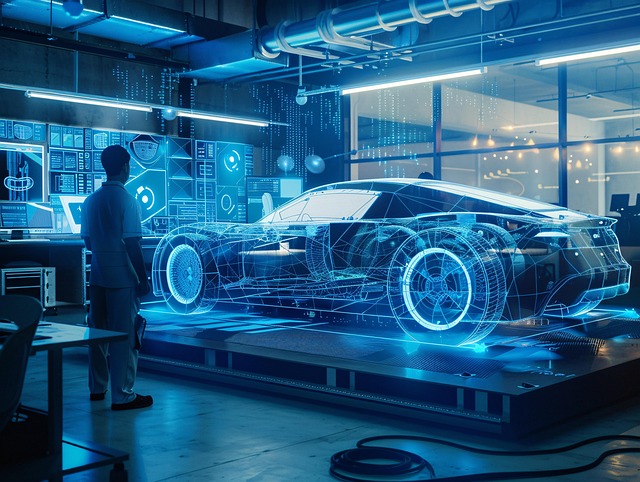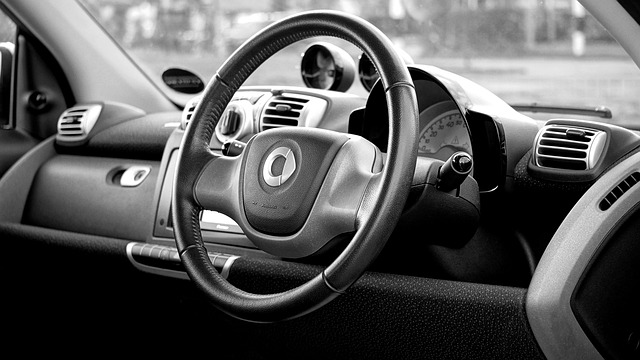Electric Vehicles (EVs), powered by smart car tech, lead global sustainable transportation. Advancements like blind spot sensors and smart parking assist drivers, while infrastructure developments, including fast-charging stations and biometric access, alleviate range anxiety. Autonomous driving capabilities and optimized routes promise safer commutes. Shared mobility services, enabled by vehicle-to-infrastructure communication and voice activation, reduce traffic congestion and emissions. Select Smart Car Tech initiative leverages connected vehicles for real-time data sharing, optimizing flow and facilitating autonomous driving. This tech promotes eco-conscious driving while maintaining comfort, redefining future mobility towards greener global transportation network.
“Unveiling Sustainable Transportation Trends with Select Smart Car Tech: Shaping a Greener Future
The global shift towards sustainability demands innovative solutions in transportation. This article explores emerging trends redefining urban mobility, powered by cutting-edge smart car tech. From electric vehicles leading the green revolution to autonomous driving’s promise of efficient urban navigation, we delve into shared mobility, active transport, smart infrastructure, and sustainable fuels. Discover how these developments are transforming personal transportation.”
- Electric Vehicles: Leading the Green Revolution
- Autonomous Driving: The Future of Urban Mobility
- Shared Mobility: Redefining Personal Transportation
- Active Transport: Pedals and Two Wheels
- Smart Infrastructure: Connecting Cities Seamlessly
- Sustainable Fuels: Beyond Fossil Dependencies
Electric Vehicles: Leading the Green Revolution

Electric Vehicles (EVs) are at the forefront of the global push for sustainable transportation, leading the green revolution on roads worldwide. This shift is driven by advancements in car tech that make EVs more efficient and appealing to consumers. One key trend is the integration of smart technology, such as blind spot detection sensors and smart parking assistance systems, enhancing safety and convenience. These innovations not only cater to drivers’ needs but also contribute to overall traffic management, making urban mobility more seamless.
The infrastructure supporting EVs is also evolving rapidly. The rise in fast-charging stations addresses range anxiety, making long-distance travel more feasible for electric car owners. Additionally, the implementation of biometric access control in charging stations ensures secure and swift transactions, further streamlining the EV ownership experience. These developments collectively contribute to a future where sustainable transportation becomes the norm, reducing carbon footprints and fostering a greener environment.
Autonomous Driving: The Future of Urban Mobility

The future of urban mobility is looking increasingly autonomous, with advancements in smart car technology rapidly transforming the way we commute. Vehicles equipped with cutting-edge features like self-driving capabilities promise to make our cities safer and more efficient. These vehicles not only enhance safety by reducing human error but also optimize routes, potentially decreasing traffic congestion and improving overall flow.
As the infrastructure supporting autonomous driving continues to develop, complete with expanding networks of fast-charging stations, we can expect a seamless integration of smart car technology into daily life. Voice command controls further elevate the user experience, allowing drivers to interact with their vehicles hands-free while staying focused on the road. These innovations collectively point towards a more sustainable and convenient transportation future.
Shared Mobility: Redefining Personal Transportation

Personal transportation is undergoing a significant transformation with the rise of shared mobility services. This trend involves the use of on-demand vehicles and ride-sharing platforms, allowing individuals to access transportation options when and where they need them. By leveraging smart car tech, such as vehicle-to-infrastructure communication and voice-activated commands, these services offer numerous benefits. They help alleviate traffic congestion and reduce the number of private vehicles on the road, leading to cleaner air and less noise pollution in urban areas.
Moreover, shared mobility promotes efficient utilization of vehicle resources, which is particularly beneficial in densely populated cities. With the integration of fast-charging stations and innovative charging infrastructure, electric vehicle (EV) sharing becomes more viable, further contributing to sustainability goals. This trend not only redefines personal transportation but also fosters a more sustainable and connected future for urban mobility.
Active Transport: Pedals and Two Wheels

The rise of sustainable transportation is witnessing a significant shift towards active modes of travel, with pedestrians and cyclists taking to the roads in growing numbers. This trend is driven by the desire to reduce carbon emissions and promote healthier lifestyles. One of the key players in this revolution is the smart integration of technology into vehicles and infrastructure. Advanced features like home automation controls from car eco-driving assistance systems enable users to optimize their journeys, reducing time and energy waste. Dynamic speed limits, implemented through green car technologies, further enhance fuel efficiency and safety.
Two wheels are becoming a popular choice for urban commuting, with electric bikes and scooters offering an efficient, cost-effective, and eco-friendly alternative to traditional cars. These vehicles not only help in minimizing traffic congestion but also contribute to a healthier environment. With remote vehicle access becoming the norm, users can control various functions of their transport from afar, adding another layer of convenience and sustainability to their travel experiences.
Smart Infrastructure: Connecting Cities Seamlessly

Smart infrastructure is transforming urban landscapes, paving the way for a seamless and sustainable transportation network. By integrating advanced technologies, cities are creating interconnected systems that optimize traffic flow, reduce congestion, and lower carbon emissions. The Select Smart Car Tech initiative focuses on utilizing connected vehicle technology to enhance communication between cars, infrastructure, and pedestrians, enabling real-time data sharing for efficient route planning and reduced travel times.
This digital transformation goes beyond mere convenience; it contributes significantly to the future of autonomous driving by fostering a safe and responsive environment. Customizable driving modes and home automation controls from the car offer personalized experiences while promoting eco-driving assistance. As these innovations mature, we can expect even more sophisticated solutions for carbon footprint reduction, shaping a greener and smarter transportation future.
Sustainable Fuels: Beyond Fossil Dependencies

The pursuit of sustainable transportation has led to a significant focus on alternative fuels, marking a decisive shift away from fossil dependencies. This evolution is not just about environmental stewardship; it’s also about empowering drivers with choices that promote green driving tips while ensuring efficient and cost-effective mobility. Advanced technologies play a pivotal role in this transition. Select smart car tech, for instance, integrates adaptive suspension systems smart fleet management, allowing vehicles to optimize performance and reduce fuel consumption. By offering user-specific settings, these innovations cater to individual needs, promoting eco-conscious driving without compromising on comfort or convenience. This dual approach—adopting cutting-edge technology while prioritizing environmental sustainability—is reshaping the future of transportation, paving the way for a greener, more responsible world.
The future of transportation is bright, powered by innovative tech like electric vehicles, autonomous driving, shared mobility, and smart infrastructure. These sustainable trends not only reduce our carbon footprint but also enhance urban living. By embracing active transport and transitioning to cleaner fuels, we’re taking significant steps towards a greener world. Select Smart Car Tech plays a pivotal role in this transformation, enabling us to navigate towards a more eco-friendly future with seamless efficiency.
